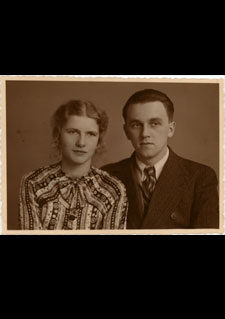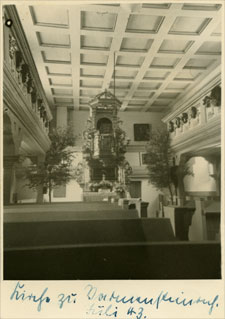Wolfgang Niederstrasser: Nazi Church Policy
Wolfgang Niederstrasser (1907–1981) was the only Bavarian pastor imprisoned in Dachau concentration camp for resistance against National Socialism. After moving from the Hannover to the Bavarian regional church, Niederstrasser initially substituted in the parish in Thundorf in 1937. He refused to display the flag on the parsonage and the church on November 9, 1938, the fifteenth anniversary of the Beer Hall Putsch. Although the local court only sentenced him to a mild fine of twenty Reichsmarks for his demonstrative act, this conflict with the Nazi authorities marked the start of persecution that ultimately nearly cost him his life.
Niederstrasser received his first call to Warmensteinach in Upper Franconia in July of 1940. After just a few months where he landed in a conflict with the local NSDAP group, which was set off by the disruption of the NSDAP Christmas party by nativity play practice. Offence was also taken at his committed sermons, which repeatedly contained allusions to the Nazi state’s anti-church policy. Niederstrasser’s distance to the Nazi regime were conspicuous outside of the church, too, since he and his wife no longer gave the “Hitler salute” (“Heil Hitler”). Following numerous denunciations, a sermon during a memorial service for fallen soldiers on June 28, 1942 was his undoing.
In the sermon, Niederstrasser protested strongly against the “13 Points” from Reich Governor Arthur Greiser (1897-1946), which were intended to force the churches in the Warthegau into a marginal existence monitored by the state and were expected to serve as a model for the entire German Reich. Niederstrasser called the 13 Points the 13 death sentences against the Christian church, opposed the elimination of the church from public life and protested against the replacement of Christian rites, such as baptism and confirmation, with Nazi ceremonies. His proclamation “Because the godless are driven by hubris, the poor in spirit have to suffer!” provoked particular displeasure (B. Mensing, Zeugnis, 768)
As a result, the district president of Central and Upper Franconia revoked Niederstrasser’s certification to teach religion. Above all, however, the public prosecutor’s office in Bayreuth charged him with continued offenses against the Treachery Act and the Pulpit Law. Niederstrasser was thus in danger of serving one to two years of prison time. His trial had not yet ended when he was drafted into military service in February of 1943. In a letter of March 20, 1943, his district dean criticized his solitariness and lectured him that he would now certainly learn in the military that no one can conduct his private war in the battery and on a grand scale. Let that be an example to you (B. Mensing, Zeugnis, 773).
In December of 1943, Bayreuth Special Court sent the case files to Niederstrasser’s unit for forwarding to the proper court martial. Although his unit wanted to abandon the trial, he was suddenly arrested, dismissed from the Wehrmacht and turned over to the Gestapo in December of 1944. Apprised of the seriousness of the situation by District Dean Bezzel, the regional consistory entered a petition for Niederstrasser’s release from prison but to no avail. Niederstrasser was transferred to horrifyingly overfilled Dachau concentration camp in April of 1945. He was driven toward the Alps on the death marches evacuating the camp but was freed near Wolfrathshausen in early May.
Source / title
- © 1+2: Private collection of Hans Niederstrasser, Lindau


